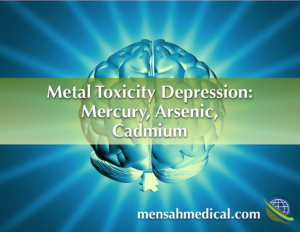
Metal Toxicity Depression: Mercury, Arsenic, Cadmium
Metal toxicity depression is the least common biotype for depression, not withstanding copper. In our research and in our history of empirical evidence through Carl
Schizophrenia is a mental disorder that affects a person’s ability to think, feel, and behave with reason. It is characterized by confusion between what is real and what is imagined, difficulty in expressing emotions, and disturbances in perceptions or thinking.
Symptoms of schizophrenia can include:
It is important for people with schizophrenia to seek treatment as soon as possible; early diagnosis and intervention may reduce long-term disability associated with this condition.
There are several different subtypes of schizophrenia, each with its own distinct set of symptoms. These include paranoid schizophrenia, which is characterized by delusions and hallucinations related to paranoia; disorganized schizophrenia, which is characterized by disorganized thinking and speech; catatonic schizophrenia, which is characterized by abnormal motor behavior such as repeating words or phrases or assuming rigid postures; and residual schizophrenia, which is characterized by social withdrawal and lack of motivation.
Separate from schizophrenia is schizoaffective disorder. This is a mental health condition where an individual may experience psychosis in adjunct to a mood disorder.
The conventional treatment for schizophrenia typically includes both medication and psychotherapy. Medications used to treat schizophrenia are usually antipsychotic drugs which are designed to reduce symptoms such as hallucinations, delusions, and disorganized thinking. Psychotherapy can include cognitive behavioral therapy (CBT), which focuses on helping the patient understand and manage their thought processes, or family therapy which helps the patient’s family better understand and support them.
In mainstream psychiatry, schizophrenia is an umbrella term given to several different mental disorders. It’s considered a devastating diagnosis and natural healing for schizophrenia is often considered impossible.
An orthomolecular understanding of Schizophrenia views the condition as caused by an imbalance in essential molecules within the body, often due to nutrient deficiencies or dysregulation. In his research, William J. Walsh, PhD, of the Walsh Research Institute, discovered that persons diagnosed with schizophrenia fall into five different biotypes: overmethylated, undermethylated, pyroluric, gluten intolerant, and high copper. Recent research, including our own, indicates that the percentage breakdown is shifting towards the majority of these cases being those who are undermethylated. Patients with schizophrenia often have high copper levels, which are known to cause psychosis. Although rare, wheat and gluten intolerance can cause schizophrenia in some cases.
These biotypes represent very different disorders, each with unique neurotransmitter imbalances and symptoms. The Walsh Theory of Schizophrenia proves that most cases of schizophrenia involve abnormal methylation or oxidative overload. Natural healing for schizophrenia is possible when body chemistry is stabilized and normalized through targeted advanced nutrient therapy.
We treat patients with schizophrenia through careful evaluation of symptoms, biochemical lab testing, and individualized supplementation to restore balance to their systems. As their biochemistry stabilizes and normalizes, their symptoms improve.
Since psychiatric medications are quite powerful and often come with unpleasant or even permanent side effects, it is important for families of individuals diagnosed with schizophrenia to consider Targeted Advanced Nutrient Therapy. Unlike psychiatric medicine which treats the symptoms of the condition, individualized and targeted advanced nutrient therapy works toward healing by correcting the imbalance that is often at the root cause of the disorder.
Many individuals diagnosed with schizophrenia have recovered as long as they continuously complied with their nutrient protocols. Patients have been able to live normal, productive, lives while continuing nutrient therapy. Some may still require a minimal dose of traditional medication in addition to nutrient therapy. This allows Mensah Medical patients to function with fewer side effects.
Schizophrenia and Schizoaffective disorder usually appears in late adolescence or early adulthood, but it can strike at any time in life. It is important to seek medical treatment at the first sign of symptoms. These vary from person to person, but many people with the disorder report experiencing delusions or hallucinations. Some report hearing voices, as well as seeing, smelling, tasting and feeling things that are not there. Many also have very inappropriate or strange behaviors, disorganized speech, decreased motivation or interest, and can appear emotionless.
Schizophrenia is linked to a combination of genetic and environmental factors. Research has suggested that genetics may play a role in determining susceptibility to the disorder, as schizophrenia often runs in families. In addition, research also suggests that changes in neurotransmitters like dopamine and glutamate may contribute to symptoms. Environmental factors such as drug and alcohol abuse, stress, or trauma have also been linked to the development of schizophrenia. While more research is needed, understanding potential causes of the disorder can help inform treatment and address any underlying issues to minimize symptoms.
Certain risk factors may increase a person’s likelihood of developing the disorder. The most significant risk factor for schizophrenia is a family history of the disorder, as it often runs in families. Other potential risk factors include:
Men tend to have an earlier age at onset, higher propensity to negative symptoms, lower social functioning, and co-morbid substance abuse than women, whereas women display relatively late onset of the disease with more mood disorder symptoms. Understanding and addressing potential causes can help minimize symptoms and potentially prevent a full onset of schizophrenia.
There are steps that can be taken to reduce the risk of developing schizophrenia. Seeking help if you have a family history of schizophrenia can be beneficial, as genetics play a role in the development of the condition. Avoiding drug and alcohol use, managing stress levels, and engaging in healthy social activities are also key factors in preventing the onset of schizophrenia. Additionally, providing children with supportive and nurturing environments may help reduce their risk for developing mental health conditions like schizophrenia later in life.
Diagnosis of schizophrenia typically involves a physical exam, laboratory tests, psychological evaluation, and family history. During the physical exam, a doctor may look for signs of any underlying medical conditions that could be causing symptoms. Laboratory tests can help rule out other illnesses as possible causes for the disorder. During a psychological evaluation, a doctor may use symptom-based questionnaires or interviews to assess an individual’s mental health. Finally, family history can provide important information about genetic links to the disorder. Treatment is usually based on a combination of medication, supplementation, and psychotherapy.
While lifestyle and home remedies may not cure schizophrenia, there are some steps that can be taken to help manage its symptoms. These include getting regular exercise and plenty of rest, eating a healthy diet, managing stress levels, avoiding drugs and alcohol, socializing with friends and family members, practicing mindfulness or relaxation techniques such as yoga or meditation, seeking support from a therapist or counselor, and staying organized by creating a daily routine. These methods can help reduce the intensity of symptoms like confusion or anxiety associated with schizophrenia.
Alternative and natural treatments for schizophrenia may include massage therapy; acupuncture; and yoga. There is currently no evidence that these alternative treatments are effective in treating schizophrenia, but some people have reported relief from their symptoms with these approaches. It is important to consult a doctor before starting any kind of alternative treatment.
Prior to your first appointment at Mensah Medical, you will be required to complete a new patient intake form as well as a patient history form. These forms must be submitted to Mensah Medical before an appointment can be scheduled. For Outreach Clinic appointments these forms must be submitted one week before the scheduled Outreach. For established patients, prior to your follow up you will be required to complete a progress report. This must be submitted via your Elation Passport at least 72 hours before the appointment.

Metal toxicity depression is the least common biotype for depression, not withstanding copper. In our research and in our history of empirical evidence through Carl

Food is Medicine: In our world today, knowing what and how to eat can feel like a daunting task. And the plethora of dietary theories and dogma only serve to create more confusion and health problems.
If there’s one thing I’ve learned over the years as a practitioner of nutritional therapy it is this: what’s good for the body isn’t necessarily good for the brain (thank you, Dr. Mensah). In other words, feed your brain first so that your body can follow.

Odor-Sensitive Patients: Patients with pyrrole disorder and undermethylation, especially those with high pyrroles, tend to have a heightened sense of smell. This makes ingesting their programs challenging. In the past, we’ve suggested wiping down the capsules, washing out the container, and airing it out to help dissipate the odor. A new option that has been very successful for our patients with pyrrole disorder, undermethylation, and high sensitivities to scents is the use of scented desiccants in their compounded prescriptions. Vanilla is a favorite.
Sign up for our monthly newsletter
